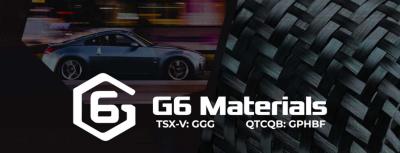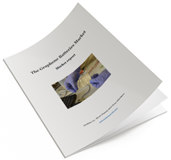Graphene Oxide: Introduction and Market News - Page 9
Graphene-Info updates all its graphene market report
Today we published new versions of all our graphene market reports. Graphene-Info provides comprehensive niche graphene market reports, and our reports cover everything you need to know about these niche markets. The reports are now updated to April 2021.
The Graphene Batteries Market Report:
- The advantages using graphene batteries
- The different ways graphene can be used in batteries
- Various types of graphene materials
- What's on the market today
- Detailed specifications of some graphene-enhanced anode material
- Personal contact details into most graphene developers
The report package provides a good introduction to the graphene battery - present and future. It includes a list of all graphene companies involved with batteries and gives detailed specifications of some graphene-enhanced anode materials and contact details into most graphene developers. Read more here!
G6 Materials raises $5 million CAD, to acquire GO application developer GX Technologies
G6 Materials (Formerly called Graphene 3D Lab) has made plans to raise $5 million CAD via a non-brokered offering. The company also announced plans to acquire GX Technologies in an all-share deal (worth around $7.5 million CAD).

GX Technologies is developing applications based on graphene oxide. GXT has a cooperative R&D agreement with the US Army Corps of Engineers to develop graphene oxide-based membranes for use in nanofiltration. The deal with GXT is expected to be closed before April 29, 2021.
Graphene oxide helps achieve efficient air processed perovskite solar cells via scalable technique
A research team, led by Dr. Luigi Angelo Castriotta at the at University of Rome Tor Vergata's CHOSE Center for Hybrid and Organic Solar Energy, has reported impressive results on methylammonium free perovskites processed in air, using a scalable technique based on infrared annealing and potassium doped graphene oxide as an interlayer.
The team reached excellent efficiencies of 18.3% and 16.10% on 0.1cm2 cell and on 16cm2 module respectively, with enhanced stability compared to the standard multi cation reference.
Graphene-enhanced G1 Wonder mask - hands on review
India-based Nanomatrix Materials (NM Materials) produces graphene-oxide materials and derivatives (such as r-GO) at its 20Kg/month GO plant, and the company recently launched its own brand of graphene-enhanced face mask, the G1 Wonder mask.
A few weeks ago, NM Materials sent us a couple of masks for a review here at Graphene-Info, and this short review will summarize our findings.
Graphene-Info updates all its graphene market report (January 2021)
Today we published new versions of all our graphene market reports. Graphene-Info provides comprehensive niche graphene market reports, and our reports cover everything you need to know about these niche markets. The reports are now updated to January 2021.
The Graphene Batteries Market Report:
- The advantages using graphene batteries
- The different ways graphene can be used in batteries
- Various types of graphene materials
- What's on the market today
- Detailed specifications of some graphene-enhanced anode material
- Personal contact details into most graphene developers
The report package provides a good introduction to the graphene battery - present and future. It includes a list of all graphene companies involved with batteries and gives detailed specifications of some graphene-enhanced anode materials and contact details into most graphene developers. Read more here!
ZEN Graphene Solutions and NPNL jointly receive NSERC grant
 ZEN Graphene Solutions, in partnership with Professor Mohammad Arjmand, has announced the award of a CAD$780,000 (around USD$609,600) Alliance Grant - part from the Natural Sciences and Engineering Research Council of Canada (NSERC) and the rest from a combination of cash and in kind contributions from ZEN).
ZEN Graphene Solutions, in partnership with Professor Mohammad Arjmand, has announced the award of a CAD$780,000 (around USD$609,600) Alliance Grant - part from the Natural Sciences and Engineering Research Council of Canada (NSERC) and the rest from a combination of cash and in kind contributions from ZEN).
Alliance Grants are awarded through a competitive peer review process, and this proposal, titled Synthesis of Graphene Nanomaterials and Development of Their Multifunctional Polymer Nanocomposites, is ZEN’s highest single monetary grant award from NSERC to date and supports NSERC’s growing interest in nanomaterials.
Graphenea now offers custom graphene oxide dispersions
Graphenea recently introduced a new service for the graphene industry, a custom  graphene oxide (GO) dispersion service. This service provides researchers with an opportunity to receive GO in a solvent and at a concentration which is most compatible with their application.
graphene oxide (GO) dispersion service. This service provides researchers with an opportunity to receive GO in a solvent and at a concentration which is most compatible with their application.
According to Graphenea, its GO is noted for its mechanical and thermal properties, in addition to having a high monolayer content (>95%). This service not only offers researchers the option of receiving GO in water at a custom concentration, but also GO dispersed into: Acetone, DMF, DMSO, Ethanol, IPA, Methanol, NMP, Tetra butyl-acetate, or Toluene.
Haydale reports its financial results for FY 2020
 Haydale announced its financial results for FY2020 (which endd on 30 June, 2020). The group's revenues reached £2.95 million, down from £3.47 in FY 2019, but its net loss decreased to £4.02 million (down from £7.19 in 2019) as the company continues to implement cost savings measures.
Haydale announced its financial results for FY2020 (which endd on 30 June, 2020). The group's revenues reached £2.95 million, down from £3.47 in FY 2019, but its net loss decreased to £4.02 million (down from £7.19 in 2019) as the company continues to implement cost savings measures.
Haydale's negative cash flow deceased by 31%, but the company still used up £3.32 million in the year and at the end of June had only £0.82 million in cash and equivalents. On September 2020 Haydale raised £2.98 million via a new share subscription.
New self-charging graphene-oxide ink battery is under development
Australian Advanced Materials has announced it is developing a graphene-oxide-based ink battery that is able to self-charge within minutes.
The cells will be created with a printable ink and designed to generate electricity from humidity in the air or skin surface to self-charge without any manual charging or wired power required. It was said the batteries will be ideally suited for use in Internet of Things (IoT) devices.
Research team develops new method to generate precisely controlled graphene microbubbles
Researchers at Swinburne University of Technology recently teamed up with teams from National University of Singapore, Rutgers University, University of Melbourne, and Monash University, to develop a method to generate precisely controlled graphene microbubbles on a glass surface using laser pulses.
 Schematic of optical setup for characterizing the GO microbubbles. Image from article
Schematic of optical setup for characterizing the GO microbubbles. Image from article
Microbubbles - around 1-50 micrometers in diameter - can have various applications like drug delivery, membrane cleaning, biofilm control, and water treatment. They've been applied as actuators in lab-on-a-chip devices for microfluidic mixing, ink-jet printing, and logic circuitry, and in photonics lithography and optical resonators. They also have great potential for other biomedical imaging and applications like DNA trapping and manipulation applications.
Pagination
- Previous page
- Page 9
- Next page
